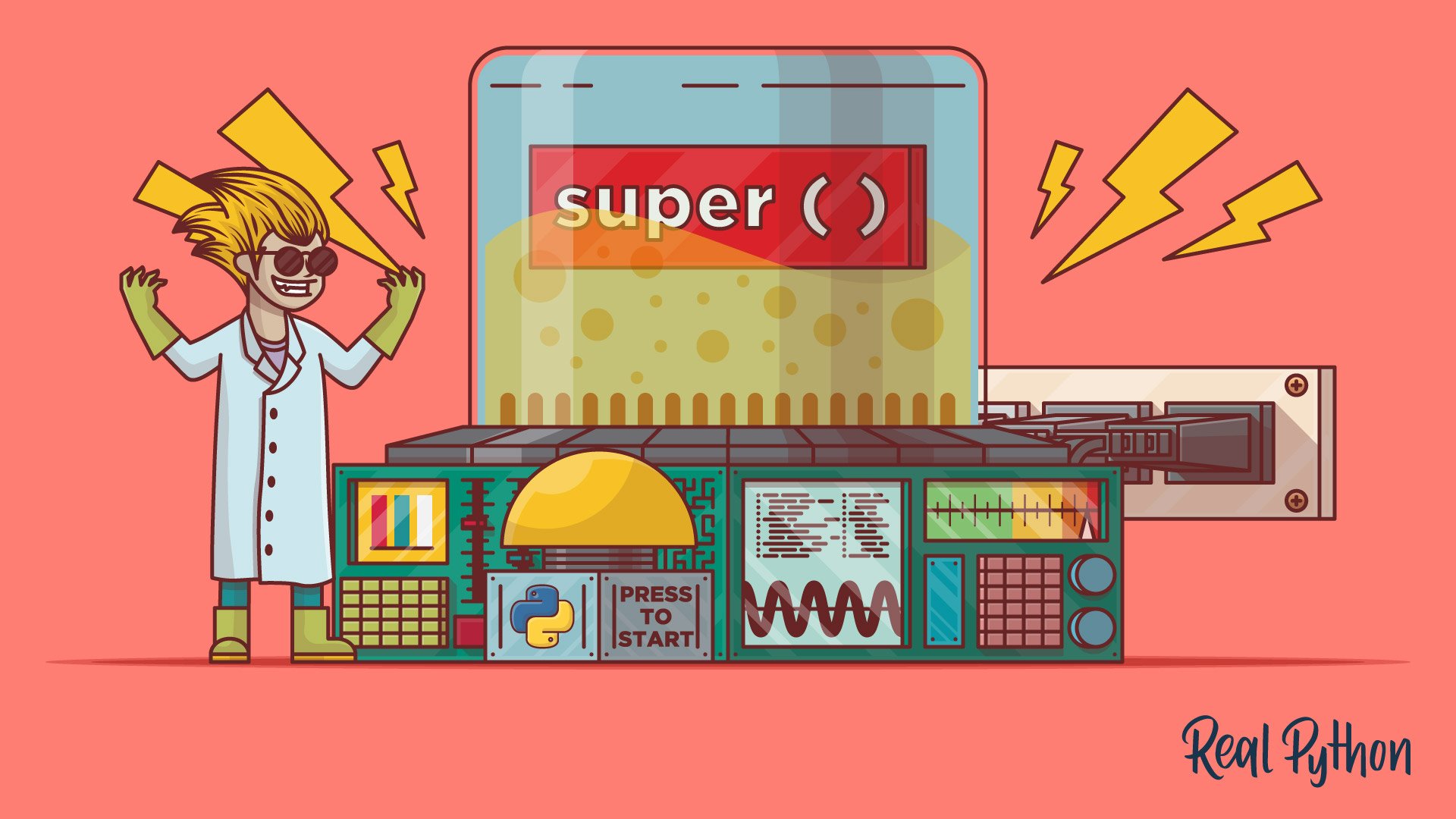Understanding Python super() with __init__
This article delves into Python's super() function and its synergy with __init__() methods, clarifying their use in inheritance for efficient code reuse.
This article delves into Python's super() function and its synergy with __init__() methods, clarifying their use in inheritance for efficient code reuse.
In object-oriented programming with Python, inheritance is a fundamental concept that allows us to create new classes (child classes) based on existing ones (parent classes). This promotes code reusability and a structured approach to representing objects and their relationships. Let's explore how two key components, super() and __init__(), work together to enable seamless inheritance in Python. We'll delve into the concepts of classes, inheritance, the __init__() method for object initialization, the role of the self parameter, and the significance of the super() function in calling methods from parent classes. Through a clear example, we'll illustrate how super().__init__() is used within the child class's __init__() method to ensure proper initialization of attributes from both the parent and child classes.
Let's break down how super() and __init__() work together in Python's inheritance system.
1. Classes and Inheritance:
2. The __init__() Method:
3. The self Parameter:
4. The super() Function:
5. Using super() with __init__()
super().__init__() inside the child class's __init__() method.Example:
class Animal: # Parent class
def __init__(self, name):
self.name = name
class Dog(Animal): # Child class inheriting from Animal
def __init__(self, name, breed):
super().__init__(name) # Initialize the 'name' attribute from the parent class
self.breed = breed # Add a 'breed' attribute specific to Dog
my_dog = Dog("Buddy", "Golden Retriever")
print(my_dog.name) # Output: Buddy
print(my_dog.breed) # Output: Golden Retriever In essence:
super().__init__() acts as a bridge, allowing you to initialize attributes from parent classes within the child class's __init__() method.This Python code defines two classes: Animal and Dog. Dog inherits from Animal. The code demonstrates how to initialize attributes in an inheritance hierarchy using the super() function to call the parent class's init method, ensuring proper attribute initialization for both the parent and child classes. An instance of the Dog class is created and its attributes are printed.
class Animal: # Parent class
def __init__(self, name):
print("Animal __init__ called")
self.name = name
class Dog(Animal): # Child class inheriting from Animal
def __init__(self, name, breed):
print("Dog __init__ called")
super().__init__(name) # Initialize the 'name' attribute from the parent class
self.breed = breed # Add a 'breed' attribute specific to Dog
my_dog = Dog("Buddy", "Golden Retriever")
print(my_dog.name) # Output: Buddy
print(my_dog.breed) # Output: Golden Retriever Explanation:
Animal Class (Parent):
__init__ method to initialize the name attribute.Dog Class (Child):
Animal.__init__ method:
super().__init__(name): This line is crucial. It invokes the __init__ method of the parent class (Animal), passing name to it. This ensures the name attribute is initialized as per the parent class's logic.breed attribute, specific to the Dog class.Object Creation:
my_dog = Dog("Buddy", "Golden Retriever"): When you create a Dog object, its __init__ method is called.print statements within the __init__ methods demonstrates the order of execution:
Animal __init__ calledDog __init__ calledAccessing Attributes:
print(my_dog.name) and print(my_dog.breed) show that both the inherited attribute (name) and the child-specific attribute (breed) are accessible.Key Points:
super() provides a link to the parent class, allowing you to call its methods.super().__init__() within the child's __init__ ensures that the parent class's initialization is executed, preventing potential issues and promoting code reusability.Great notes! Here are some additional points to consider, expanding on the provided explanation:
Why is super() Important?
super(), you'd have to directly call the parent class's __init__ method using the class name (e.g., Animal.__init__(self, name)). This becomes tedious and error-prone, especially with multiple levels of inheritance.super() makes your code more adaptable to changes. If the parent class's structure changes, using super() ensures that your child class still initializes correctly.super() helps navigate the inheritance chain correctly according to Python's MRO. It ensures that methods and initializers are called in the appropriate order.Common Pitfalls:
self: When calling super().__init__(), remember that it's still a method call within the child class. You need to pass self as the first argument.super().__init__() match the parameters defined in the parent class's __init__() method.Beyond __init__():
__init__(), super() can call other methods from the parent class as well. This is useful for extending or overriding inherited behavior.In Summary:
super() and __init__() are essential tools for clean, maintainable, and robust inheritance in Python.| Feature | Description
In conclusion, understanding the interplay between super() and __init__() is fundamental for harnessing the power of inheritance in Python. By calling super().__init__() within a child class's __init__() method, we ensure the proper initialization of attributes inherited from parent classes. This practice not only promotes code reusability but also establishes a clear and organized structure for object creation within an inheritance hierarchy, ultimately leading to more maintainable and robust object-oriented code.
 Exploring the Power of Python super() Function | Explore the Python super() function in-depth, its syntax, and the advantages it offers in inheritance.
Exploring the Power of Python super() Function | Explore the Python super() function in-depth, its syntax, and the advantages it offers in inheritance. Python Super() With Init() Method - GeeksforGeeks | A Computer Science portal for geeks. It contains well written, well thought and well explained computer science and programming articles, quizzes and practice/competitive programming/company interview Questions.
Python Super() With Init() Method - GeeksforGeeks | A Computer Science portal for geeks. It contains well written, well thought and well explained computer science and programming articles, quizzes and practice/competitive programming/company interview Questions. Understanding classes, init and self - Python Help - Discussions on ... | Could you explain this code excerpt? I am learning and trying to get in touch with the logic of classes. class NewWindow(tk.Toplevel): def init(self): super().init() self.title("Another window")
Understanding classes, init and self - Python Help - Discussions on ... | Could you explain this code excerpt? I am learning and trying to get in touch with the logic of classes. class NewWindow(tk.Toplevel): def init(self): super().init() self.title("Another window") Why super().__init() ¿? - Beginner (2018) - fast.ai Course Forums | Hi!! I have read a lot and search in stackoverflow, but I do not really get what does super() do. Can somebody explain to me in simple words why is it used? what would happen if it gets removed? Thanks a lot!
Why super().__init() ¿? - Beginner (2018) - fast.ai Course Forums | Hi!! I have read a lot and search in stackoverflow, but I do not really get what does super() do. Can somebody explain to me in simple words why is it used? what would happen if it gets removed? Thanks a lot!
super() and __init__() in Python | Sentry | The Problem What does super() refer to in Python and why is it often used in init() methods? The Solution In Python, super() is a built-in function… Supercharge Your Classes With Python super() – Real Python | In this step-by-step tutorial, you will learn how to leverage single and multiple inheritance in your object-oriented application to supercharge your classes with Python super().
Supercharge Your Classes With Python super() – Real Python | In this step-by-step tutorial, you will learn how to leverage single and multiple inheritance in your object-oriented application to supercharge your classes with Python super().
super() and __init__() in Python, with Examples - DEV Community | In Python, super() and init() are fundamental components of object-oriented programming that... Add a post method, equivalent to the __new__method, but ... | I author a package (openpnm) that provides some generic classes, which we expect users to subclass, and I’ve recently come to wish that our generic classes could run some code AFTER the subclass has been initialized. At the moment, the user writes their code (e.g. defining some constants, etc) in the init of their subclass, and the only ‘trick’ they need to remember is to call super().init() at the top of the method. But I would really like to be able to ‘clean’ up the initialization b...
Add a post method, equivalent to the __new__method, but ... | I author a package (openpnm) that provides some generic classes, which we expect users to subclass, and I’ve recently come to wish that our generic classes could run some code AFTER the subclass has been initialized. At the moment, the user writes their code (e.g. defining some constants, etc) in the init of their subclass, and the only ‘trick’ they need to remember is to call super().init() at the top of the method. But I would really like to be able to ‘clean’ up the initialization b...